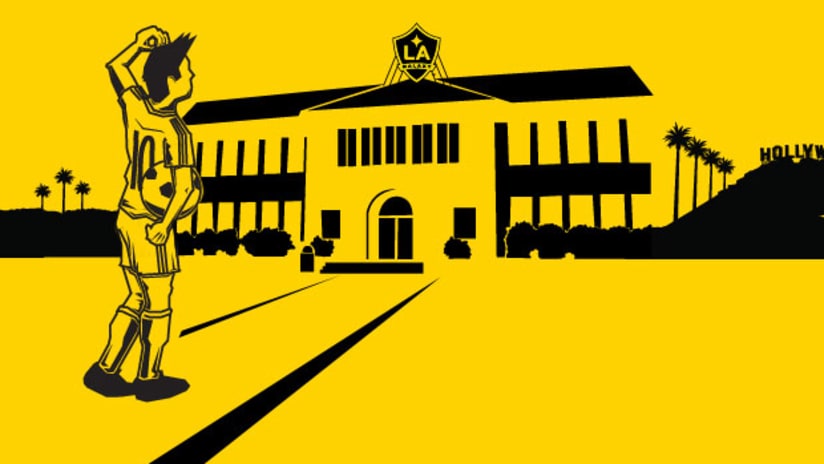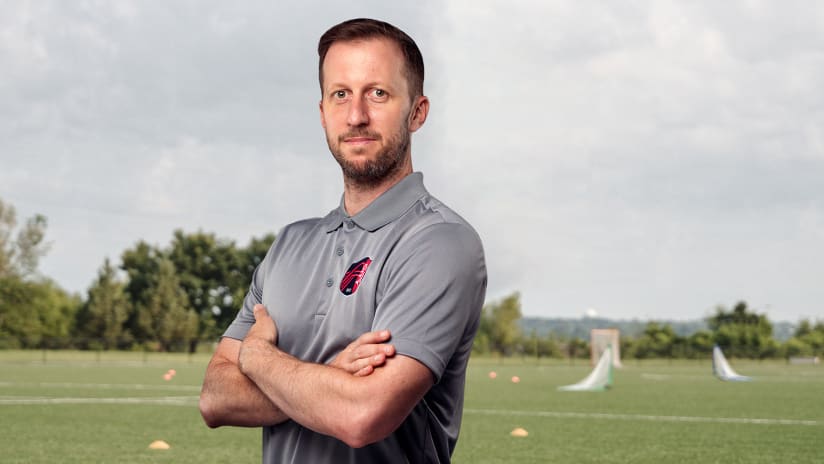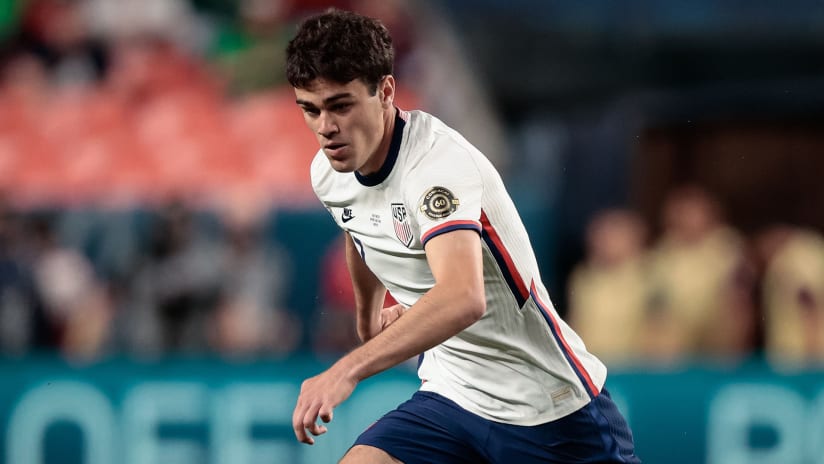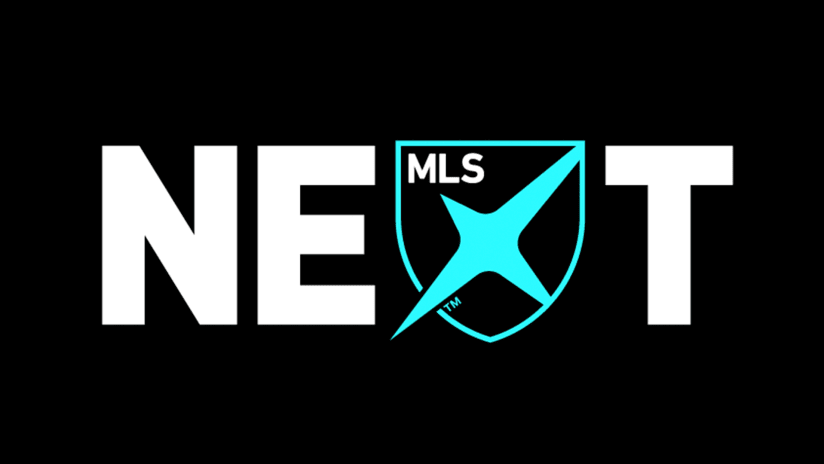THE WORD is MLSsoccer.com's weekly long-form series. This week, senior editor Nick Firchau looks at the recent rise of the LA Galaxy academy system and how the team has mined the most fertile soccer soil in the country to land four Homegrown players since 2011.
The LA Galaxy’s capture of the next big star in American soccer began not with a draft-day declaration or a ceremonial unveiling at the Home Depot Center, but instead with a simple meeting during July 2011 in a Milwaukee hotel sometime just after dinner.
Jose Villarreal was two months shy of his 18th birthday and slugging it out in commuter traffic on the 405 twice a week back then. He drove from his family’s home in the diverse, working-class Los Angeles suburb of Inglewood south into Orange County and to a final stop in the middle-class beachside suburb of Costa Mesa.
Google Maps told Villarreal the drive would take about an hour each way, but he knew better. It was at least 90 minutes each way once traffic swallowed him up on the freeway, meaning there was a good chance he’d spend more time commuting to practice than actually playing.
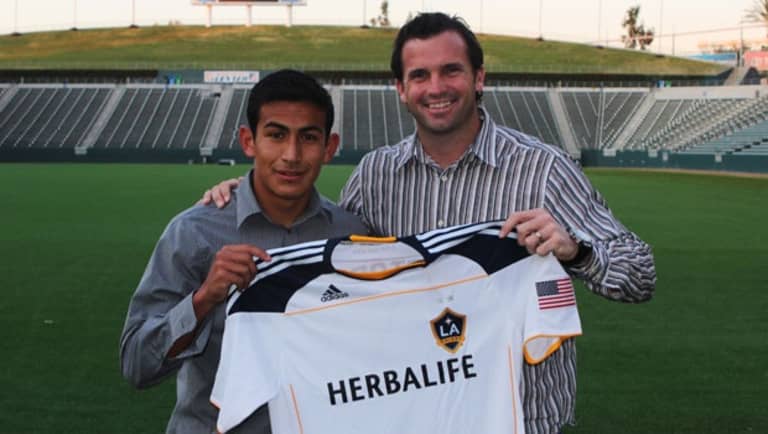
Los Angeles teenager Jose Villarreal (left) and current LA Galaxy president Chris Klein, after Villarreal signed on as a Homegrown player in 2011. (Courtesy of LA Galaxy)
When Chris Klein approached him as the head of the LA Galaxy’s development academy, Villarreal was ready to listen. He and his teammates from rival Southern California youth club Pateadores were on the brink of the Under-17 national championship that week in Wisconsin, and Villarreal was exactly what the Galaxy wanted: one of the best players in Los Angeles, on one of the best youth teams in the country.
The Galaxy had seriously considered Villarreal’s future before, but this latest flirtation caught the teenager’s attention. And most young soccer players in Southern California know that if the stars align so well that Chris Klein smiles and shakes your hand, it just might mean your days of wasting away on the freeway are done.
Shortly thereafter, Villarreal began the 20-minute drive four days a week from Inglewood to LA’s academy facilities in Carson. By the end of 2011, he had a contract with the Galaxy’s first-team, and he made his professional debut in July 2012. He’s scored two career MLS goals in 15 regular-season appearances since then, each one a last-gasp strike that saved the Galaxy from a loss.
This summer, he’ll be the biggest name on the US roster bound for the FIFA U-20 World Cup in Turkey, following in the footsteps of players like Jozy Altidore, Michael Bradley and Sacha Kljestan.
“I told [Klein] I wanted in,” Villarreal says of the move that set him in motion. “Everything has just sort of gotten better from there.”
---
Chris Klein called it quits on his playing days in 2010 after a decorated 13-year career that included one MLS Cup, four MLS All-Star selections, two major knee surgeries and a reputation as one of the toughest iron men in league history. Now 36 years old, Klein still holds the MLS record for consecutive games played (141) and games started (118), and ranks fifth in league history with 333 career appearances.
He spent the final three-and-a-half seasons of his career with the Galaxy, and he’s been something of an institution there ever since. His rise has been impressive and swift, culminating when he reached the pinnacle in January, joining Alexi Lalas as the only former players in league history to become a club president.
But Klein’s first job was to help usher the Galaxy academy through its infancy. They carried just two teams when he took over as senior director in December 2010 – the Under-18s and Under-16s – and had largely missed the mark with their first shot at signing a Homegrown player, Tristan Bowen. They became pioneers of U.S. Soccer’s Development Academy system when they signed Bowen, a 17-year-old Van Nuys native, to a Homegrown contract, but by the time Klein took the job Bowen was an afterthought in the Galaxy system. Bowen was dealt to Chivas USA after lackluster returns in two years with the first team.
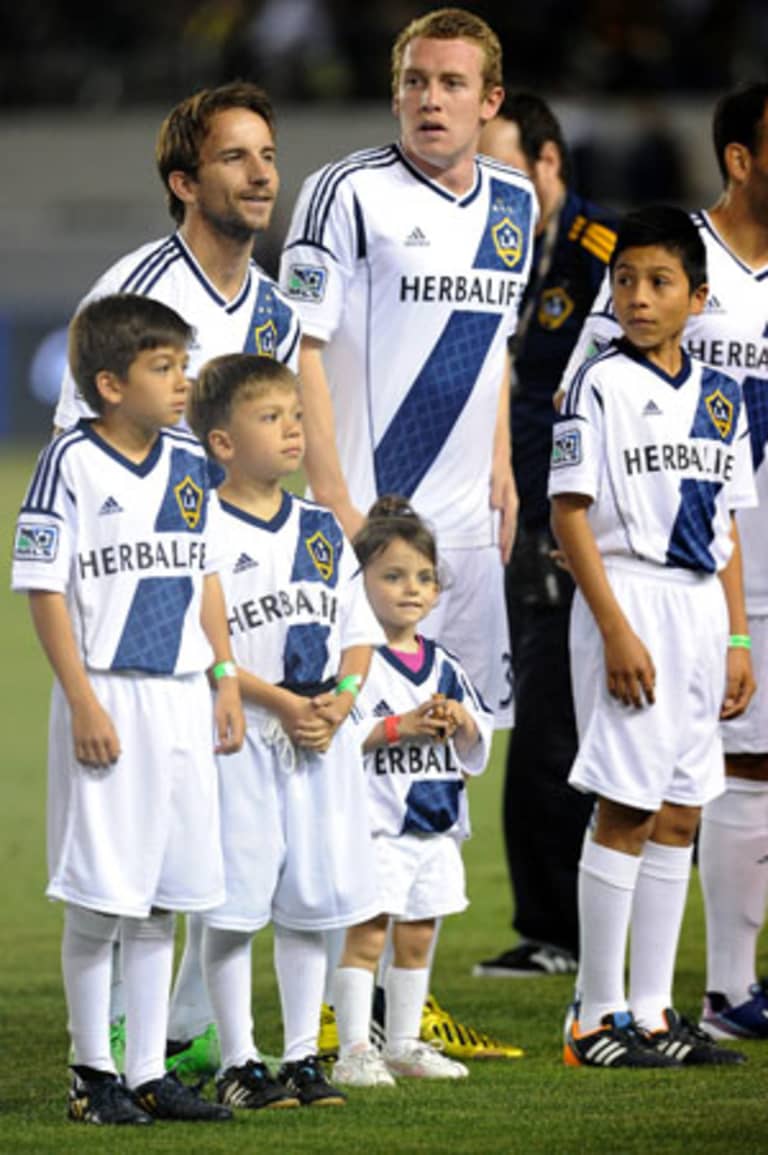
Jack McBean (center) was first scouted by the Galaxy academy system as sophomore in high school in Newport Beach, Calif. After signing a Homegrown contract in January 2011, he eventually became the youngest player in franchise history to score a goal. (USA Today Sports)
Klein, meanwhile, was tasked with a bigger project than simply bringing in the next teenage star. He took charge of the aggressive and meticulous expansion of the Galaxy academy to better canvas Southern California, and put the club’s stamp on an even younger generation of players.
The academy rapidly expanded to the U12, U13 and U14/15 ranks, casting a larger net across Southern California to wean younger players on the Galaxy’s philosophy and the tantalizing idea that they, too, might one day play on the star-studded senior team.
“We’re always going to sign players like David Beckham, Landon Donovan and Robbie Keane,” Klein says. “But to fill out our roster, we should be developing players from our own area, who have grown up watching the Galaxy and watching Landon Donovan.”
READ: Villarreal shines for US Under-20 team in CONCACAF Championship
Klein and the Galaxy found exactly what they expected when they looked at the larger picture: a wealth of talent for the taking. According to statistics compiled by international sports rights agency Kentaro Group for MLSsoccer.com, there are roughly 141,000 registered young male soccer players eligible to play in the Galaxy’s youth system. The Galaxy whittle that number down to the 135 best players to fill out their ranks.
Klein doesn’t hesitate to compare his club’s regional pull to the heavyweights of Europe – think of kids in Manchester or Madrid yearning to play for their respective local teams and you’ll know where his head is at – and it’s tough to argue the Galaxy aren’t already headed in that direction. Like Manchester United or Real Madrid, the pull of the Galaxy’s facilities, decorated coaching staff and tradition of first-team success is often times too much to ignore for the area’s best young talent.
“Everyone who heard about the Galaxy knew that it was a top club,” Villarreal says. “It was a good team to play against, and you knew if you played well against them, maybe you’d get a scout after you.”
Adds Jack McBean, the 18-year-old forward from Newport Beach who was first scouted by the Galaxy as a sophomore in high school and signed a senior-team contract in January 2011: “When you see the talented players coming in and out now, it’s pretty obvious. All the best players want to be here.”
Still, the success hasn’t come without a serious financial investment. Klein confirmed for MLSsoccer.com reports that the Galaxy's total investment in their academy is between $1.5 and $1.75 million, placing "among the top three in MLS in terms of how much we’ve invested,” according to Klein.
The Galaxy have also assembled an impressive staff that now includes as many as five coaches watching youth soccer games every weekend in Southern California, all scouting for the next potential academy recruit. The next Villareal or McBean.
The academy’s coaching staff includes former MLS players such as Ante Razov and Ted Eck, as well as a blast from the club’s past in Mauricio Cienfuegos, the three-time MLS Best XI selection who now works with the team’s 12- and 13-year-olds. World Cup veteran Clint Mathis also supervises their youth camps and clinics.
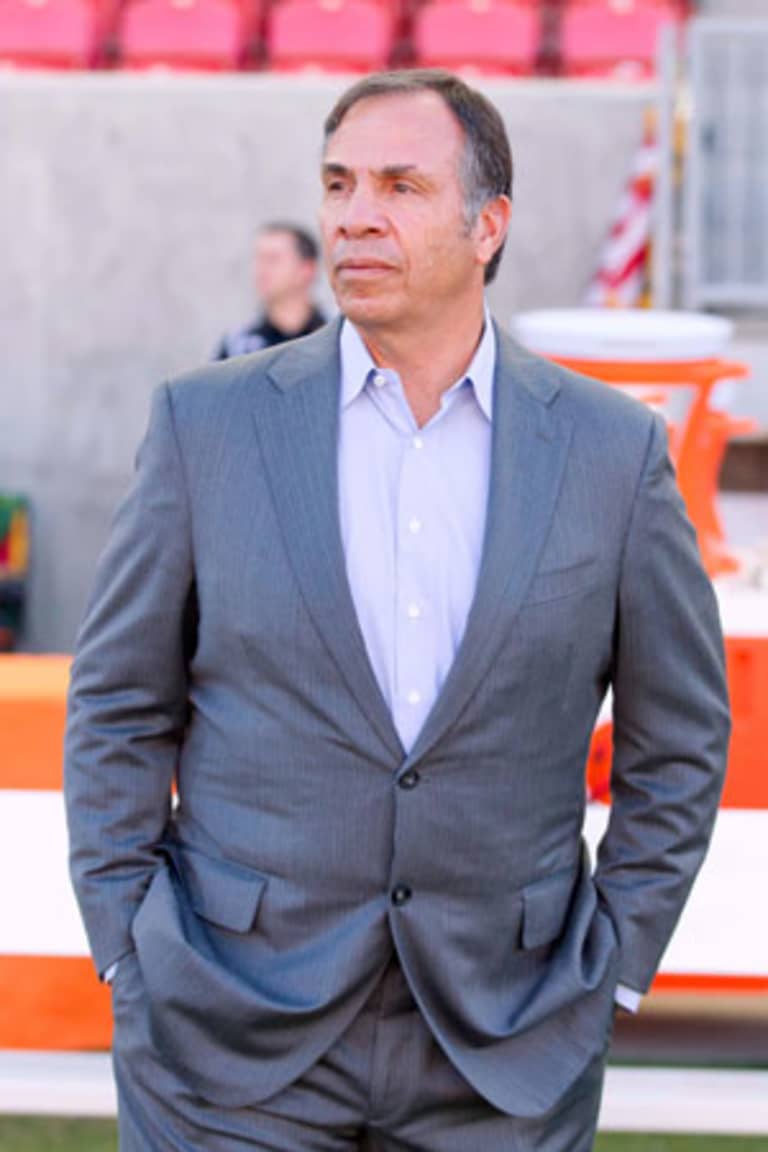
LA Galaxy head coach and GM Bruce Arena does not work with the academy on a day-to-day basis, but he has the final word on which players the club signs to the first team. They have signed four players since 2011. (USA Today Sports)
Players at all levels attend some type of training session as many as six times a week in Carson, including weight and fitness sessions along with on-field workouts. They arrive straight from school in most cases, and stay as long as five hours before their day is through.
On Saturday nights, a number of the players attend Galaxy games at the Home Depot Center. They watch head coach Bruce Arena pace the sidelines. They join the crowd as it erupts when Donovan or Keane bursts into open space behind the defense, or even when an academy alum rises from the bench to take his call.
And then there's the kicker, something Galaxy scouts assuredly tell parents across the sprawl of Southern California’s youth soccer fields every Saturday: Unlike some of the pay-to-play private clubs operating without the backing of a sports business behemoth like AEG, every player in the academy trains and plays for free.
"The Galaxy have the resources where it’s no cost for the families," UCLA head coach Jorge Salcedo says. "To couple that with the facilities and everything they offer, it’s too enticing to compete against.”
And, evidently, not many others are putting up a fight. Because of development academy rules, no MLS club outside of Los Angeles can encroach into the Galaxy’s territory, and the local competition, Chivas USA, have yet to prove a worthy adversary. There’s an increasing threat these days from Mexican scouts leering over the fences in Carson, but Klein can brush some of those concerns aside for now. Today he has the pick of the litter in the best market in the country, and there’s little to nothing standing in his team’s way.
“The competition – I don’t want to belittle it, but at the end of the day we’re the Galaxy,” he says. “And for the most part, if we come calling, players want to come.”
---
As the senior director of coaching for the Costa Mesa-based Pateadores youth club, John Szczuka has watched as the Galaxy picked up steam in the youth ranks, loaded up on big-name coaches, and, in the two years since Klein took the reins in Carson, recruited two star Pats players.
Pateadores has roots in the local soccer scene arguably as deep as any club in Southern California, with the alumni to prove it. MLSers Danny Cahill, Matt Reis, Josh Saunders and Luis Gil all played there, as did US national team midfielder Maurice Edu. Odds are there is plenty more future talent in their ranks today.
The Galaxy academy's player pyramid shows the path to the Galaxy first team, which winds through the team's feeder clubs and development academy team. (Courtesy of LA Galaxy)
Villarreal played for Pateadores in 2011, when he led the club’s Under-17 team to the national championship during that fateful trip to Milwaukee. And Oscar Sorto – an 18-year-old defender raised by Salvadoran parents who first identified with the Galaxy at six years old when his father drove him past a training session and they spotted Cienfuegos – played for Pats, too, before he joined the Galaxy academy system in 2011. He signed a Homegrown contract with the team last December.
The Galaxy have an alliance with two other Southern California youth club teams that serve as feeder programs to the academy: South Bay Force in Redondo Beach and the West Coast Futbol Club, based in Laguna Hills.
There is, however, no such relationship with Pateadores, and there likely never will be. The two are fiery competitors at the youth level.
Pateadores is the kind of club potentially left by the wayside as the Galaxy and other MLS clubs become more aggressive in their youth development. LA’s expansion has changed the soccer landscape in Southern California, forcing all the top competitive youth clubs to raise the level of investment in their elite-level teams.
READ: Sorto still committed to US, despite Salvadoran influence
And yet, Klein doesn't view it as a competition at all.
“We do not compete with the clubs in Southern California. We just don’t," he says. "We’re the best professional team in this area and, you could argue, the country. Our goal is not to win our local summer league. Our goal is not to win a tournament and get a trophy. As this goes along, hopefully that will become clear to the different clubs in Southern California.
“What we’re trying to do is to get them to understand we want the elite of the elite. We have 135 players in the academy, across Southern California, across six age groups. We’re not looking to gut teams. We’re looking to put a player in an environment they would never get anywhere else and develop them.”
For the other clubs, though, there is a worry that if they lose the elite players in their system, the club will suffer. The loss of players like Villarreal and Sorto means Pateadores, which employs dozens of staff coaches, might not enjoy as much success in the future, and become a less attractive destination for young players.
"I see their side, because they’re trying to build something, and they want their teams to be successful," says Galaxy technical director Jovan Kirovski. "But at the end of the day, we all want to make professional soccer players, and good players for the US national team. They’re still going to have good players, but people want to play for the Galaxy. People want to be professional soccer players, and this is the place to do it."
Szczuka sees something being lost in this arrangement. Not every player will become a professional, obviously, and the Galaxy’s model is not focused on developing players who won't reach that top level.
"[The Galaxy academy] is the right place to be if you’re one of the Homegrown players," Szczuka says. "If you are a paid Homegrown player, it’s worth going and taking advantage of because they’re investing in your future. If you're not, there are some real decisions to be made."
Klein won’t argue that the Galaxy academy inevitably favors the development of the elite player, but he makes no apologies about landing Villarreal and Sorto. He insists the club built a strong relationship with the players’ youth team coach at South Bay Force before they both moved to Pateadores in 2010, and that the Galaxy always begin conversations about potential recruits first with the club team coach, and not the player himself.
“If the club doesn’t want to be involved, we’ll approach the player … but we’ve made a great effort to involve the clubs in the decision we make to bring a player in,” Klein says. “We have no issues giving credit where credit is due.”
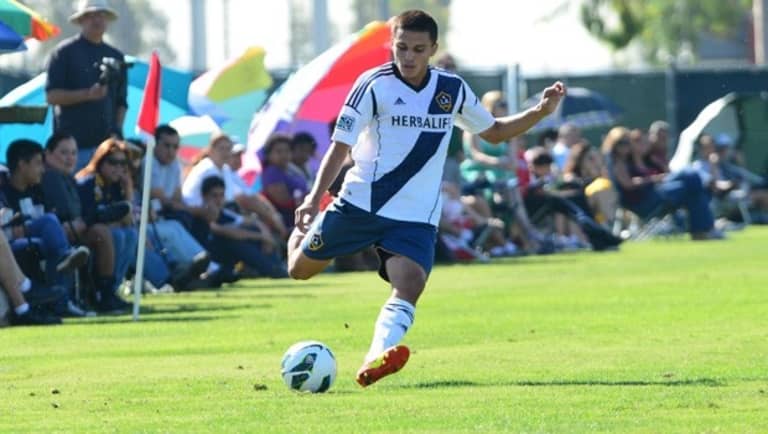
LA Galaxy defender Oscar Sorto played with famed Southern California club Pateadores before he was signed by the Galaxy academy in 2011. Asked about the relationship between the two clubs, a Pateadores official says, "we have no relationship." (Courtesy of LA Galaxy)
Asked if a club like Pateadores could accuse the Galaxy of poaching their older players, Klein insists that the club’s expansion over the past two years has cut down on the number of outside players they’ve had to recruit.
“It’s still a process to get local coaches to understand that we’re not after all of their players,” he says. “A lot of people make a living in coaching youth soccer, and if they have a good team, their club is better respected. So they’re reluctant to give up players. Or, at least they were in the past.”
Szczuka argues that local clubs like his aren’t actually warming at all to the idea that the Galaxy should get their way, but it doesn’t seem to matter much in the long run. He and Klein don’t agree a great deal on the subject other than the potential for their shared future as competitors.
“The landscape in Southern California changes year to year, so I wouldn’t rule out anything,” Szczuka says. “But I don’t see anything changing in the near future.”
---
Klein, meanwhile, continues undaunted. After the club inked McBean, Villarreal and Sorto, they officially signed Gyasi Zardes, a Hawthorne native who starred at Cal State Bakersfield, to a Homegrown contract in December.
Of the four Homegrowns currently on LA's roster, Sorto is the only one without an MLS appearance, after Zardes made his debut late last month. Villarreal is either a super sub off the bench or an option to start at forward in a pinch, and McBean could return to a starting role when he returns from a broken clavicle in the coming weeks.
Still, even with McBean on the mend and the others still gradually learning their way, this is what success is shaping up to look like in Los Angeles. The Galaxy have surged to the front of the pack in the race to secure the next wave of talent in MLS by demographics, determination or both, drawing the gaze of more and more adoring teenagers and the envy of their competitors all at once.
Such is life these days in Carson, where there's a franchise to shape, work to do and an entire city to cover. There is another Villarreal out there in the Galaxy’s backyard, in Torrance or Fullerton, Fontana or Long Beach. Perhaps he's even rooted to the brake pedal somewhere on the expressway, waiting in limbo.

